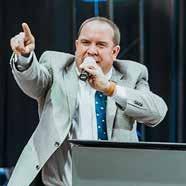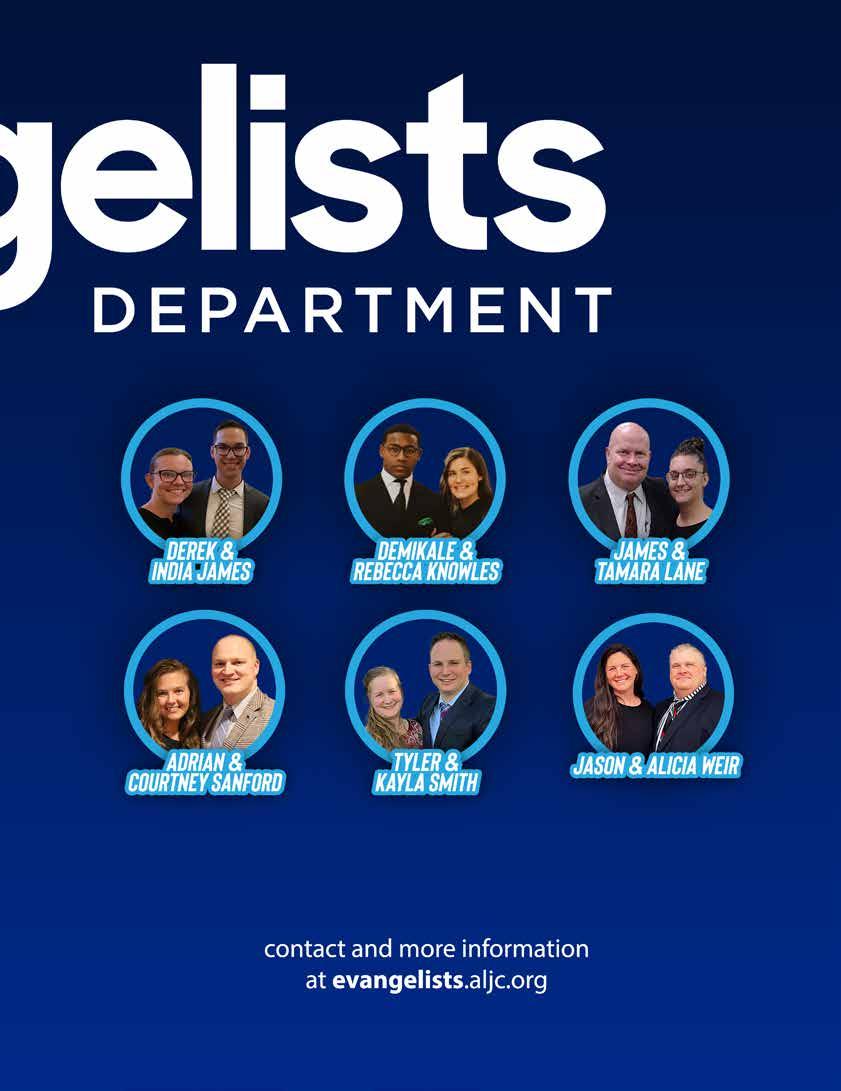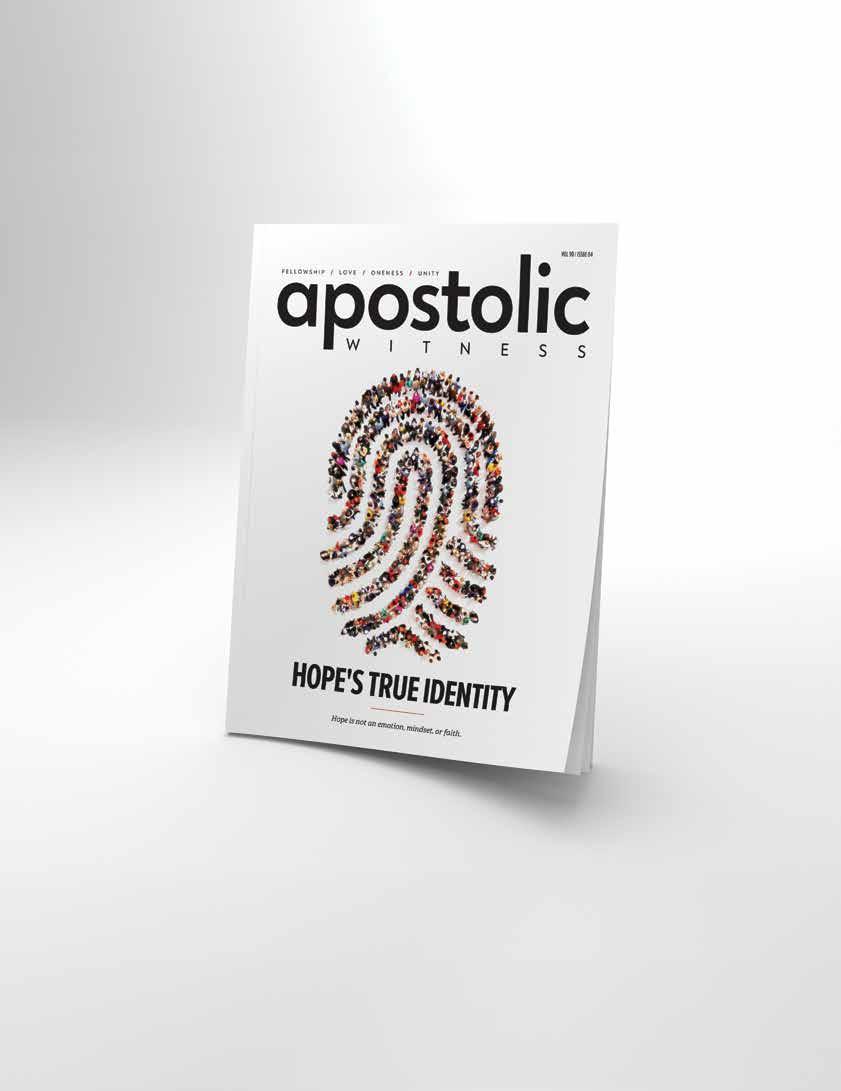

RADICAL COURAGE
True courage comes from embracing our God-given design and standing firm in our faith, regardless of the circumstances.

875 North White Station Rd • PO Box 22366 • Memphis, TN 38122
Phone: 901.685.1969 • aljc.org
Editor-in-Chief | Nate Whitley
Art Director | Dale McBroom
Apostolic Witness is the quarterly publication and official organ of the Assemblies of the Lord Jesus Christ. Periodicals postage paid at Memphis, TN (USPS #028-040) and additional mailing offices. To order reprints call 901.685.1969
POSTMASTER: Send address changes to: Apostolic Witness • PO Box 22366 • Memphis, TN 38122-0366
SUBSCRIPTION RATES
Individual subscriptions $20 per year. Send subscription information and check to address listed above.
ADVERTISING RATES
1/4 page $200 • 1/2 page $300 • Full page $500
For information, insertion order, or full rate card & editorial calendar, please email: editor@apostolicwitness.com
LETTERS TO THE EDITOR
editor@apostolicwitness.com (may be edited)
DOCTRINAL TRUTHS
The Assemblies of the Lord Jesus Christ asserts that the Bible is the inspired Word of God, and that the fundamental plan of salvation consists of these major doctrinal truths: Belief in the Lord Jesus Christ as the one true God; Repentance from sins; Baptism by immersion in water in the name of Jesus Christ; Baptism of the Holy Ghost with the initial evidence of speaking in other tongues.
EXECUTIVE BOARD
General Superintendent | Kenneth Carpenter
Southern Regional Assistant | Jonathan Vazquez
Northern Regional Assistant | Kenneth Allen
Western Regional Assistant | Robert Wimberley
General Secretary | Josh Wilson
DISTRICT SUPERINTENDENTS
Alabama | Ronnie Allen
Arkansas | Daniel Nooner
Florida | Luis Rodriguez
Georgia | Donald Wineinger
Greater New England | J. Craig Ouellette
Gulf Coast | Phillip McKissick
Heartland | Edward MacDonald
Greater Illinois | Tracy Zimmerman
Indiana | Tim Gill
Kentucky | Phillip Cook
Louisiana | David Poole
Michigan | Shannon Scott
Mississippi | Gary Porterfield
Missouri-Iowa | Anthony Marshall
NY/Mid-Atlantic | Wayne Byrd
Ohio | Mark Hina
Oklahoma | Curt Green
Southeastern | Stacy Garnett
Tennessee | Steve Smith
Texas | Peter Gray
Tri-State | Mark McCool
Western | Robert Jones
West TX/New Mexico | Simon King
West Virginia | Ralph Tisdale
HONORARY SUPERINTENDENTS
Raymond Bishop | Steve Wilson | Robert Martin
DEPARTMENT
World Missions | Matthew Ball
Missions America | Stephen Trachsel
Evangelists | Shawn Garnett
KidzQuest | Nate Roberts II
DIRECTORS
Student Ministries | Zach Hammond
Women’s Esprit | Terri Scott
Menistry | James Chessor
Christian Education | Caleb Tisdale


General Superintendent Kenneth Carpenter
DEPENDENT SHEEP, WISE SERPENTS, & HARMLESS DOVES
Editorial by Nathan S. Whitley

Jesus warned His disciples about the dangers they would face as His ambassadors, especially after His resurrection and ascension. While they had already confronted demons and illnesses during His ministry (Mark 6:7-13), new opposition and enemies of the gospel would arise after Pentecost.
Modern believers face many of the same challenges as the first church. Our adversaries may not be Jewish leaders and Roman overlords, but they are just as dangerous. As the culture and world grow darker by the hour, Christians must heed Jesus’ advice if we are to navigate the perilous terrain of our world.
Jesus was sending the disciples out among wolves. In Israel, wolves were the most common natural enemy of sheep. They roamed the hills and valleys, looking for sheep that strayed from the flock or lagged behind. When a wolf found such a sheep, it quickly attacked and tore it to pieces. Even a grown, healthy sheep was utterly defenseless against a
wolf. Wolves are known for being merciless and ferocious (Ezek. 22:27).
Christians are commissioned to go into the wolves’ territory. We are called to rescue the prey from the devourer. Such a mission is dangerous and critical. The church is dealing with many precarious situations. Darkness and evil are prevalent in every community, whether in the suburbs or the metropolis. The culture is growing more tolerant of wickedness and more intolerant of righteousness. Just as Nero blamed Christians for burning Rome, which began some of the worst Christian persecution in history, modern culture awaits the right opportunity to cast blame for any event on Christians. We should be warned that Christian persecution is at our doorstep, and the wolves’ appetite is increasing.
Jesus likened the disciples to sheep. The natural enemy of sheep is the wolf, and sheep are considered
prey of wolves. Sheep are defenseless without a shepherd. They do not have claws or sharp teeth or any hard covering on their bodies to protect them. They are meek and rely on their shepherd to protect and keep them from harm.
Sheep are dependent upon their shepherd. The shepherd leads them through rough terrain. Lovingly, the shepherd prods the sheep to stay with the flock on the right path. The shepherd protects against enemies and danger. Without the shepherd, they are vulnerable to predators.
The Christian depends upon Jesus Christ, the Good Shepherd (Jn. 10:11). You and I are nothing without Christ. Every day, we rely on His guidance, provision, and protection. Every obstacle, problem, and issue needs the instruction of the Good Shepherd. Christians must recognize their deficiencies, casting all care upon Christ because He cares (1 Pt. 5:7). Relying on God’s wisdom and power is essential in navigating delicate situations.
How were the disciples to handle such perilous conditions? Jesus said they were to be as wise as serpents. The serpent was considered wise in Egyptian hieroglyphics and Ancient Near East lore. Serpents represented cunning, craftiness, and caution. They were thought of as subtle and shrewd.
The disciples needed to be as wise as serpents to handle opponents and opposition. Along with depending upon the Shepherd, they were to handle situations shrewdly and cautiously. Paul told the Colossians to conduct themselves with wisdom toward outsiders (Col. 4:5). James wrote that if anyone lacks wisdom, he should pray to receive it from God (Jam. 1:5). God is willing to give wisdom to those who ask in faith.
In times of chaos and confusion, Christians must possess wisdom. This wisdom goes beyond
mere knowledge and information; it involves understanding what actions to take and when to take them. Wisdom is also about knowing what to say and when not to say it. Our counsel must be baptized with wisdom and immersed in prudence. The book of Proverbs is replete with advice on how to take caution with spoken words. Jesus even said that the Holy Spirit would teach the disciples what to say during turbulent times (Lk. 12:12; Jn. 14:26).
The disciples were to be wise as serpents and harmless as doves. Notice that Jesus does not tell them to take the defensive posture of a serpent, ready to attack. No, Jesus wants the disciples to be wise and harmless. The wise Christian is gentle. The Spirit-filled individual will be taught what to say by the Holy Spirit and be as gentle as the Holy Spirit. This may be why the imagery of the dove is used in connection with the Holy Spirit (Jn. 1:32). We should note that gentleness is a fruit of being filled with the Spirit (Gal. 5:23).
Delicacy is essential in many situations that believers encounter. People’s hurt and brokenness, stemming from humanity’s original fall, require a gentle approach. Being sensitive to others’ problems is not a sign of compromise; it demonstrates genuine compassion. This world needs more compassion alongside our shared truth (Eph. 4:15).
Instead of avoiding conflicts confronting the church, we should equip ourselves with Jesus Christ’s instructions. The wolves of our communities may never become extinct. However, we can be dependent as sheep, wise as serpents, and harmless as doves.
Nathan S. Whitley Editor
The Gift

by General Superintendent Kenneth Carpenter
Life moves us through seasons—times of joy and sorrow, planting and reaping, laughter and tears. We’re always in one—either entering a new chapter or stepping out of an old one. God designed it this way, weaving our days into a tapestry of purpose, every thread marked by His hand. He’s promised to make all things beautiful in His time. But hear me: when the seasons turn dark, when loss and pain crash in, where do we stand? That’s where Job’s story meets us headon—a man who faced every season and proved God’s grace is greater than our storms.
THEN: A SEASON OF BLESSING
Consider Job, a man from the land of Uz, upright and true, walking in reverence before God, shunning evil with every step. His life overflowed with abundance—seven sons and three daughters brought joy to his home, while his fields flourished with an abundance of livestock, a clear testament to his vast wealth. He stood as the greatest in the East, not by chance, but by God’s favor. Job didn’t just exist—he thrived, wrapped in a season of blessing we can scarcely imagine.
Surrounding him stood a divine hedge, a shield of God’s protection, enveloping family, work, and soul. This wasn’t prosperity—it was the reward of a righteous life, a man submitted to the Lord. Every morning, he rose early, offering sacrifices for his children, praying, “Perhaps they’ve strayed; let me cover them.” He guarded their hearts with a father’s love, living out his calling with unwavering trust. God Himself called him “my servant Job” time and again—a badge of honor for a life poured out in faith.
But Satan, the accuser, crept in with a challenge: “Does Job love You for nothing? Haven’t You hedged him in, blessed his hands until his wealth overflows? Strip it away, and he’ll curse You to Your face.” That lie wasn’t just for Job—it’s aimed at us: “You only trust God when it’s easy.” Yet Job’s “then” shouts a truth: real faith isn’t built on what we hold—it’s anchored in Who holds us. His season of blessing wasn’t the source of his devotion; it was the fruit of a heart rooted in God’s righteousness. “He that walketh uprightly, and worketh righteousness… he shall dwell on high” (Isaiah 33:15-16). Trust Him in the “then,” church, for He’s faithful when the blessings flow!
NOW: A SEASON OF LOSS
But then came the storm—swift and fierce. In one devastating blow, Job lost it all. Raiders stole his livestock, slaying his servants. A wind toppled the house where his children gathered, crushing their lives beneath it. Fire rained down, turning his flocks to ash. In a heartbeat, wealth and family vanished, chaos stripping him bare. What did Job do? He tore his robe, shaved his head, fell to his knees—and worshipped. “Naked came I out of my mother’s womb, and naked shall I return thither,” he proclaimed. “The LORD gave, and the LORD hath taken away; blessed be the name of the LORD!” No words of cursing, no pointing of fingers—just praise ascending from the desolation.
But the “now” waxed yet more grievous. Satan smote Job again, afflicting him with sore boils from the sole of his foot unto the crown of his head. He sat among the ashes, scraping his
wounds, his strength wasting away. His wife, broken by sorrow, came unto him and cried, “Dost thou still retain thine integrity? Curse God, and die!” Yet Job’s steadfastness endured: “Thou speakest as one of the foolish women speaketh. What? Shall we receive good at the hand of God, and shall we not receive evil?” His faith towered above despair, unyielding. Then his friends drew nigh, and though they sat silent at the first, they soon accused him, saying his woes were the fruit of sin hidden in his life. Job rebuked them sharply: “Ye are miserable comforters—suppose ye perish, shall not all wisdom cease with you?” Alone, he lamented, “Why died I not from the womb?” This “now” was exceeding bitter—loss heaped upon loss, treachery shadowing affliction—yet Job clave unto his hope.
Here’s the power, church: in his darkest “now,” Job didn’t bow to Satan’s lies. The accuser prowls, slandering us day and night, but he’s defeated by the blood of the Lamb, the testimony of our faith, and a love that endures to the end. Job’s worship was his weapon, his trust his shield. He proved faith isn’t shaken by loss—it’s forged in the fire of Who remains. Jesus said, “In the world ye shall have tribulation: but be of good cheer; I have overcome the world” (John 16:33). And we’re told, “The LORD is nigh unto them that are of a broken heart; and saveth such as be of a contrite spirit” (Psalm 34:18). When your “now” hits, choose praise over despair, trust over doubt—God’s grace is stronger than your storm!
WHEN: A SEASON OF RESTORATION
Job’s story doesn’t stop in the ashes, thank God! One day, the heavens roared, and God spoke—His voice mighty and clear. Job, who had known Him only by what he’d heard, now saw Him face-to-face. “Mine ear had heard of thee,” he confessed, “but now mine eye seeth thee.” Humbled, he sank low in dust and ashes, saying, “I have uttered that I understood not; things too wonderful for me, which I knew not.”
This wasn’t defeat—it was surrender, a turning to God that opened the way to freedom.
And then came the “when”—a divine shift. Job prayed for his accusing friends, and in that act of mercy, God broke his chains. Restoration didn’t just trickle in—it poured out. His fields burst with 14,000 sheep, 6,000 camels, a thousand yoke of oxen, and a thousand she asses. Seven sons and three daughters filled his home with new joy. His wife stood by him, his family returned, bringing gold and comfort to his side. Job lived 140 more years, seeing four generations, and he died old and full of days.
God made it beautiful in His time—that “then” of blessing, “now” of trial, and “when” of triumph, all stitched into a tapestry of faith. Job’s struggle turned to victory, not by his own strength, but by trusting God’s plan. “They that sow in tears shall reap in joy” (Psalm 126:5). And Jesus promised, “Behold, I make all things new” (Revelation 21:5)— Job lived this promise!
OUR SEASONS, GOD’S PROMISE
Life’s seasons don’t come with a guidebook— some bring sunshine, others storms. Are you in a “then,” hedged by God’s favor? Praise Him there! In a “now,” battered by loss or lies? Hold fast— your “now” isn’t the end! Waiting for the “when,” aching for restoration? Lift your eyes—it’s coming! Job’s story proclaims it: God is faithful. Satan’s accusations can’t derail His purpose. So stand firm in the promises of God! Worship in your ashes. Pray through your pain. Trust the One who turns seasons of loss into seasons of gain. Job didn’t escape the storm—he praised through it, and God lifted him higher than before. Your “when” is on the way—a restoration beyond your dreams.
AW
Bishop Kenneth Carpenter General Superintendent

BRINGING EVERY SINNER HOME.
BRING THEM HOME OFFERING
JUNE 18, 2025 | GOAL: $50k Join us at GMC this year for a powerful service dedicated to bringing hope across the nation! We’re aiming high with a $50k Bring Them Home Offering and we need YOU to make it happen. Every dollar you give will empower our AAC pastors to fuel life-changing outreach: tent revivals, recovery programs, Bible studies, block parties, and so much more.
HOW TO GIVE MORE TO MISSIONS THAN YOU EVER THOUGHT POSSIBLE
by Matthew Ball

God spoke a promise through the prophet Malachi that if we would bring our tithes into the storehouse, He would:
“… open you the windows of heaven, And pour you out a blessing, that there shall not be room enough to receive it” (Malachi 3:10).
Paul reminded the church of Jesus’Jesus’ words:
“I have shewed you all things, how that so labouring ye ought to support the weak, and to remember the words of the Lord Jesus, how he said, It is more blessed to give than to receive” (Acts 20:35).
As Christians, we wholeheartedly believe in these promises. As pastors, we communicate these concepts in our preaching and teaching. We who support God’s work with our finances have personally experienced the blessings that come to those who generously give to God’s Kingdom.
One area of giving that brings great joy and satisfaction is giving to world missions. Giving to
missions enables us to connect to the work of God in far-away places we will likely never personally visit. Missions giving is the most unselfish because we invest in the Kingdom of God in places where we receive no immediate personal benefit. When we give to missions, we give to a cause dear to God’s heart. I believe special blessings come to those who give to help spread the gospel to regions of the world beyond our local church and community.
We all desire to increase our giving to missions –individually and as churches. I’m inspired to give more when I hear stories of churches or individuals giving large sums to world missions. When I realize the harvest is plenteous, but the laborers are few, I’m challenged to give more. When I hear of the sacrifice of missionaries around the world, I’m compelled to give more. But is there a practical and systematic way to increase my giving to world missions? The answer is yes! In fact, I want to share how you can give more to missions than you ever thought possible.
Several years ago, Bishop Kenneth Carpenter shared with me a concept that has enabled our church to give more to missions than I ever dreamed
possible. Following his advice, at the beginning of the new year, I looked at the total that our church gave to missions in the previous year. I decided that in that new year, our church would increase the total amount given to missions by ten percent compared to last year. Ten percent isn’t a lot – I knew we could do that.
By following this method, if a church, for example, was giving a total of $1500 per month to missions in a particular year, by adding ten percent, that church would give $1650 per month in the new year. The following year, by increasing ten percent again, that church would be giving $1815 per month.
Faith Apostolic Church of Carmel has been following this plan for over a decade. Each January, our secretary gives me a breakdown of the total amount we gave in the previous year and which missionaries or projects we gave to. I add ten percent to that total and allot that new amount to whatever fields I feel led to support that year. Do the math. Adding ten percent annually will result in doubling the original amount in just 7.2 years. One would triple the original amount in just 11.5 years.
I’m in awe of how much our church gives monthly to missions. If you had asked me ten years ago if our church could ever afford to give the amount we are giving today, I would have said, “No way! It’s not possible. We could never afford to give that much and pay our mortgage, utilities, payroll, and other expenses.” But do you know what? We’ve never been unable to meet the commitment we made each new year. The money has always been there.
We are not in a less favorable financial situation today due to annual increases in giving to missions –we are in a better financial position. God has blessed our church financially, and I’m 100% convinced it is because of our giving to missions. We are debt-
free. We can take good care of our staff and save for future growth. We just completed a 7-figure remodel and expansion project and did not have to borrow a penny. I’m grateful for God’s blessings, and I know His blessings result from our giving to world missions.
I don’t plan on stopping. We’ll continue to increase our missions giving by ten percent each year. I just did the math. I’m blown away by seeing what we’ll give in 10 more years at this pace. It’s more than I ever thought possible!
If you want to give more to missions than you ever thought possible, employ this simple yet effective plan. The best time to start this method was 10 or 20 years ago. But the 2nd best time is today. If a church were giving a small amount per month to missions, it would take many years to reach a significant amount. So, you may want to “jump-start” the process initially by doubling what you’ve been giving for a few years. But remember, by simply adding 10% annually, you will double the original amount in about 7 years and triple it in about 11 years.
If you aren’t a pastor but still want to give more to world missions and see greater blessings unfold, you can apply these same principles! Look at what you gave to World Missions last year and add 10%. You will be amazed at how God will provide for you when you make a greater commitment to giving to His Kingdom.
“Give, and it shall be given unto you; good measure, pressed down, and shaken together, and running over, shall men give into your bosom. For with the same measure that ye mete withal it shall be measured to you again” - Jesus.
Matthew Ball World Missions Director
VESSELS OF LIGHT
by Tyler Pruitt

“God is light, and in him is no darkness at all.” (1 John 1:5, KJV)
“For thus saith the high and lofty One that inhabiteth eternity, whose name is Holy…” (Isaiah 57:15, KJV)
What if science and scripture converged to reveal the timeless nature of God? Albert Einstein’s theory of relativity offers a fascinating lens: time, as we know it, does not affect light. A photon, traveling at the speed of light, experiences no passage of time. From its perspective, the universe is instantaneous—a frozen moment. Could this be a glimpse into the nature of God, who declares His omnipresence in Jeremiah 23:23-24: “Am I a God at hand, saith the Lord, and not a God afar off? … Do not I fill heaven and earth?” David echoes this in the Psalms, marveling that no matter where he goes, God is there.
This interplay of light, time, and divinity shines brilliantly in the Gospel of John, a cherished text for many believers. John 1 unveils the dual nature of Jesus Christ—fully God, fully man. “In him was life; and the life was the light of men. And the light shineth in darkness;
and the darkness comprehended it not” (John 1:4-5, KJV). John the Baptist, the forerunner, was not that Light but came to bear witness to it (vv. 7-8). Here we see God as light—unbound by time and space, stepping into our world and out again, transcending the limits of human comprehension.
LIGHT MEETS TIME: A MIRACLE ON THE WATER
Let’s test this idea with a familiar miracle. In Matthew 14, Jesus walks on the sea. No explanation is required— He is God incarnate—but consider Einstein’s theory. When the Light (Jesus) intersects with time, something extraordinary happens. The disciples, fearing for their lives amid the storm, witness time itself pause as Jesus strides across the waves. The Creator bends creation to
“Today, we live in a dark age...yet this darkness is our opportunity. The Church can shine brighter than ever, igniting an end-times revival."
His will. While His divinity alone suffices as proof, it’s thrilling to see science align with scripture, affirming that Jesus is exactly who the Bible declares Him to be.
Darkness and the Cross: The Dual Nature Unveiled
Fast forward to Calvary. “Now from the sixth hour there was darkness over all the land unto the ninth hour. And about the ninth hour Jesus cried with a loud voice, saying, Eli, Eli, lama sabachthani? that is to say, My God, my God, why hast thou forsaken me?”
(Matthew 27:45-46, KJV). Here, the dual nature of Christ emerges again: 100% God, yet 100% man. Why did Jesus cry out? I propose that for the human side of Christ to die, the divine Light—the deity within Him—had to step back. When darkness fell, it marked the moment the man, Jesus, faced the weight of sin alone, fulfilling the purpose of the cross.
This moment was no accident. Calvary paved the way for the Resurrection, which in turn ushered in Pentecost. The death, burial, and resurrection of Jesus were the necessary steps for our salvation. And with that victory, we—His followers—became vessels of His Light.
FROM WITNESSES TO BEARERS OF LIGHT
John the Baptist bore witness to the Light, but at Pentecost, something greater happened. Peter proclaimed that with the outpouring of the Holy Ghost, we too would become witnesses of Jesus (Acts 2). The sign? “Cloven tongues like as of fire” sat upon each
believer (Acts 2:3, KJV). Fire has long symbolized heat and light. Now, we are called to carry that flame. As 1 John 1:6-7 warns, “If we say that we have fellowship with him, and walk in darkness, we lie, and do not the truth: But if we walk in the light, as he is in the light, we have fellowship one with another…”
Jesus Himself declared, “Ye are the light of the world” (Matthew 5:14, KJV). We are His hands and feet, tasked with reflecting the “glorious light of the gospel” (2 Corinthians 4:4). Science tells us light shines brightest in darkness, and scripture confirms it. Today, we live in a dark age—where people, as foretold, have become “lovers of pleasures more than lovers of God” (2 Timothy 3:4, KJV). Yet this darkness is our opportunity. The Church can shine brighter than ever, igniting an endtimes revival.
A CALL TO SHINE
We are vessels of Light in a world desperate for hope. Like photons racing through the cosmos, unaffected by time, we carry an eternal message. The darker the night, the more radiant our witness. Let us rise, reflect His glory, and herald the gospel of Jesus Christ. The time is now—let’s be the light He’s called us to be.
Rev. Tyler Pruitt serves as Promotions Director for the Apostolic Witness
General Ministry Conference (GMC), held each June, is the premier conference of the ALJC. Much more than an annual business meeting, GMC brings Apostolics from around the world together for worship and the Word.
GMC represents the best of the best in teaching, preaching, and worship and also serves as the backdrop for the ALJC Bible Quizzing Championship Tournament.
$80/person | On-site Registration: $90/person















Monday, June 16 @ 7PM
$65/person | Register by June 1 at gmc.aljc.org



ALJC Leadership Connect Dinner
General Superintendent Kenneth Carpenter and First Lady Penny Carpenter warmly welcome ministers and their spouses to a special dinner gathering.The evening will start at 7:00 PM, with doors opening at 6:45 PM, offering a delightful opportunity for friendship, great food, and meaningful fellowship. This annual event emphasizes the theme of unity that connects the ALJC family.




LUNDY LOGUE Wilmington, NC
JOSH WILSON General Secretary
KENNETH CARPENTER General Superintendent
DANIEL TAYLOR AYC Director
JEFF MOSES LaFollette, TN
RAYMOND WOODWARD Fredericton, NB
RADICAL COURAGE
by Steve Smith

L. Frank Baum, in his classic book The Wonderful Wizard of Oz, introduced the world to Dorothy and her traveling companions: her dog Toto, the Scarecrow, the Tin Woodman, and the Cowardly Lion. It is unnatural and strange to describe a lion as cowardly. The world recognizes the lion as the King of the Jungle. Lions are by nature conquerors, not cowards; ferocious, not fearful; intimidating, not intimidated. Yet the Cowardly Lion admitted that while he knew everyone expected him to be brave, he was convinced he was born timid and confessed he had no idea how to change.
As the saga continues, Dorothy and her friends gain an audience with the Wizard of Oz. The Cowardly Lion desperately wants the Wizard to give him courage. While the Wizard promises to do so, he lacks the power to bestow courage upon the lion. However, the Wizard of Oz persuades the Cowardly Lion that he has received courage, so he lives the rest of the story as a courageous lion. Nothing about the lion changes except his belief that he is fearless. He is designed to be brave, and now he fully embraces that truth. Once he grasp this reality, he fulfills the purpose for which he was created.
The Apostle Paul wrote to his young protégé, Timothy, that “in the last days perilous times shall come” (2 Tim. 3:1). In other words, the end times will be days in which “the culture of society will become extremely fierce” (2 Tim. 3:1, TPT). Luke wrote that it would be a time when the hearts of humanity will fail them because of fear (Luke 21:26). Amid uncertainty and anxiety, the Bible shows us how to live for God faithfully instead of fearfully. We can possess radical courage by living according to the scripture’s principles.
Like the King of the Jungle, God created the church to stand tall in the face of adversity, have courage during challenging times, and have faith in the face of fear. We must securely place our faith, hope, and fears in God’s hands. We must adamantly embrace whose we are and who we are. You are a part of the church of the living God. We stand on Jesus’ promise that He would build His church and that all of the powers of hell could not overcome it. After teaching the Ephesus church about the Armor of God, Paul wrote, “and having done all, to stand. Stand” (Eph. 6:13b-14a). After doing everything you know to do, stand! Because you have proven weapons to overcome sin, Satan, and self.

Courage is not the absence of fear but the presence of fortitude in the face of fear. Courage is fear that has put on its work boots. No doubt, the young men who stormed the beaches of Normandy on D-Day during World War II were nearly paralyzed by fear. Yet, despite their terror, they pressed forward to gain a tremendous victory for the Allies that day. Courage is moving forward despite our apprehension, concern, or dread.
Courage is not the absence of fear but instead pointing our fear in the right direction. Matthew instructs, “And fear not them which kill the body, but are not able to kill the soul: but rather fear him which is able to destroy both soul and body in hell” (Matt. 10:28). We only have two options: we will fear God or we will invariably fear man. The fear of God means the reverent awe of God. It values His Word, will, and way in everything we do.
The writer of the book of Proverbs explains, “The fear of the Lord is the beginning of wisdom” (Prov. 9:10a). Conversely, “The fear of man brings a snare, but whoever trusts in the Lord shall be safe” (Prov. 29:25, NKJV). Therefore, wisdom starts with a healthy respect for God, but looking to people for our validation and security brings a snare.
The scripture provides numerous promises to those who possess a reverent awe of God. The individual who fears God will enjoy a long life (Prov. 10:27), will have strong confidence and a place of refuge (Prov. 14:26), and the angel of the Lord will protect them (Ps. 34:7). Further, they will have the strength to depart from evil (Prov. 16:6), will perfect holiness as they walk with God (2 Cor. 7:1), and the mercy of the Lord will cover them (Ps. 103:11-14). Additionally, they will want for nothing (Ps. 34:9) because God promises them riches, honor, and life (Prov. 22:4).
Poet and author Karle Wilson Baker insightfully wrote, “Courage is fear that has said its prayers.”
As humans, we will always have concerns, stress, and worries. However, if we can worry about a situation, we can pray about the same circumstance. Therefore, we can turn our stressful worries into spiritual warfare and repurpose our anxious ponderings into answered prayers.
Daniel embraced a radical perspective that impacted every part of his life. Daniel firmly believed that God controlled every moment of his life. He had such a tremendous respect for God that it influenced his every action and attitude. Daniel is an excellent example of radical purpose, purity, prayer, and prophecy. Yet, these admirable qualities are firmly rooted in his radical perspective that God is in control.
He refused to eat the food offered to idols (Dan. 1) because he was more concerned about offending a God he could not see than upsetting a king he could see. While just a young man, God enabled Daniel to interpret Nebuchadnezzar’s dream, thereby delivering all the wise men of Babylon from the king’s executioner (Dan. 2). Because of a healthy fear of God, Daniel’s three friends, Shadrach, Meshach, and AbedNego, dared not bow to the golden statue of the King (Dan. 3). In a fit of rage, Nebuchadnezzar bound and threw them into the fiery furnace. When the king looked into the furnace, he saw four men loose and walking about in the fire. The king exclaimed, “The form of the fourth is like the Son of God” (Dan. 3:25).
Founding Father Benjamin Franklin once said, “I have lived, sir, a long time, and the longer I live, the more convincing proofs I see of this truth—that God governs in the affairs of men. And if a sparrow cannot fall to the ground without his notice, is it probable that an empire can rise without his aid?”
Over and over again, Daniel’s life confirmed his belief in this profound truth. His actions agreed with the statement by Simon Peter and the other Apostles, “We ought to obey God rather than men” (Acts 5:29).
“Christians should be the calmest people on earth. We have no right to run around this world in frenzied activity, staying up and walking the floor at night wondering what will happen. God in heaven rules the kingdoms of men."
His reverent awe of God enabled him to boldly inform Nebuchadnezzar that God would turn him into a beast of the field who would eat grass like a cow for seven years (Dan. 4). Further, he interpreted the handwriting on the wall for Belshazzar (Dan. 5).
Without fear or favor, he prophesied to Belshazzar that his kingdom would be numbered, weighed, and divided that very night.
After celebrating his eightieth birthday, Daniel’s deep devotion to God compelled him to ignore a law that forbade anyone from petitioning a god or man for thirty days other than King Darius (Dan. 6).
When Daniel learned that the statute had become law, he went home and opened his window toward Jerusalem and prayed three times a day, as was his habit. Of course, his loyalty to God landed him in the lions’ den. Just as God delivered his friends in the fiery furnace, He also delivered Daniel out of the lions’ den.
Outside of Jesus, few, if any, biblical characters illustrate how to live in these perilous times like Daniel. His autobiography reads like a modernday rags-to-riches story. From his lowly position as a captive, he rose through the ranks again and again, ultimately rising to the highest echelons in the government of his captors. Nebuchadnezzar made him ruler over the province of Babylon and the chief administrator over all the empire’s leading men (Dan. 2:48).
After Nebuchadnezzar’s death, Daniel continued to serve the king’s successors until finally, after Cyrus of Persia conquered Babylon and installed Darius as king, Daniel became the chief executive over the entire Babylonian empire (Dan. 6:3, 28). In today’s terms, he served as the Persian Empire’s prime minister.
Daniel likely influenced as many as thirteen kings and four kingdoms in his lifetime. Daniel had an enormous influence on these kings. Wicked though most of the kings were, Daniel’s counsel, courage, and absolute integrity often turned them away from idolatry and led them to recognize the power of the true God.
His influence in Nebuchadnezzar’s and Darius’s lives is evident because these great kings admired Daniel and considered him a friend. Even though he often had to tell them what they did not want to hear, they listened to him and respected his counsel because of his unquestionable honesty and loyalty.
The account of Daniel’s life is undoubtedly one of history’s great success stories, a living illustration of Proverbs 22:29: “Do you see a man who excels in his work? He will stand before kings; he will not stand before unknown men.”
Daniel lived to see Cyrus (Dan. 1:21), the Persian leader, conquer Babylon in October 539 BC, some sixty-six years after Daniel was taken captive. By
this point, Daniel was probably over eighty years old and had lived a godly life in the public eye for almost seventy of those years. He had outlasted some of the most powerful kings the world had ever seen.
Daniel lived nearly his entire life as an exile in a foreign land—as a hostage in a culture hostile to his faith. The message of Daniel, then, is not that God will remove all forms of oppression in our lives. Instead, this account serves as a promise from God that His people can find success and remain faithful to Him even in the most trying of circumstances. Daniel lived in a culture that was utterly pagan, yet there is not a negative word said about him in the entire Bible. When the leaders of Babylon tried to uncover some fault in his life, they found nothing worthy of mention except his faith in God (Dan. 6:4-5).
From the first to the last page of his book, Daniel clearly saw God’s hand in everything that happened. Prominent above every other theme in the book of Daniel is God’s control over the affairs of all the rulers and nations of the world and their final replacement with the true King. Being persuaded that the Lord is behind everything changes everything.
If we are honest, many of us would admit that we sometimes fear our God might not be as big as our Babylon. We would never say that out loud; however, it is how we feel and respond emotionally and behaviorally.
Christians should be the calmest people on earth. We have no right to run around this world in frenzied activity, staying up and walking the floor at night wondering what will happen. God in heaven rules the kingdoms of men. Always remember, God is in control of who is in control.
In his book You’ll Get Through This, author and pastor Max Lucado wrote: In the days leading up to the war with Germany in
World War II, the British government commissioned a series of posters. Capital letters in a distinct typeface were used, and a simple two-color format was selected. The only graphic was the crown of King George VI.
The first poster was distributed in September of 1939. It read, “Your Courage—Your Cheerfulness— Your Resolution—Will Bring Us Victory.” Soon a second poster was produced: “Freedom Is in Peril— Defend It with All Your Might.” These two posters appeared up and down the British countryside. On railroad platforms and in pubs, stores, and restaurants. They were everywhere.
A third poster was created yet never distributed. More than 2.5 million copies were printed yet never seen until nearly sixty years later when a bookstore owner in northeast England discovered one in a box of old books he had purchased at an auction.
The poster bore the same crown and style of the first two posters. It was never released to the public but was held in reserve for an extreme crisis, such as invasion by Germany. The bookstore owner framed it and hung it on the wall. It became so popular that the bookstore began producing identical images of the original design on coffee mugs, postcards, and posters. Everyone, it seems, appreciated the reminder from another generation.
It read: Keep Calm and Carry On.
When we understand and embrace God’s radical courage, we can do just that: Keep Calm and Carry On. “For God hath not given us the spirit of fear; but of power, and of love, and of a sound mind” (2 Tim. 1:7).
Rev. Steve Smith serves as Pastor of Faith Apostolic in Germantown, TN and as the District Superintendent of the Tennessee District. AW
ONE MORE NIGHT IN BETHLEHEM
by Paul McGee

“But the man was unwilling to spend the night. He got up, departed, and arrived opposite Jebus (that is, Jerusalem). The man had his two saddled donkeys and his concubine with him.” — (Judges 19:10 - HCSB)
For reasons we don’t fully understand, the Levite’s concubine left him and returned to her father’s house in Bethlehem. After being without her for four months, he traveled 20-25 miles to bring her back. When the Levite arrived in Bethlehem, his father-in-law warmly received him and urged him to stay. The father-in-law even suggested that he stay for three days.
On the fourth day, when the Levite intended to leave, his father-in-law kept asking him to wait a little longer, saying, “Why not have a meal before you go?” He offered food, encouraging him to eat, relax, and keep his strength up. As time passed, the father-inlaw urged him again, saying it was getting late and he wouldn’t have time to travel much that day. “Why don’t you just stay another night and leave tomorrow morning?” he suggested. After more convincing, the Levite agreed.
As they packed to leave on the fifth day, the fatherin-law offered one more meal, and the Levite stayed until the afternoon. Each time the father-in-law insisted he stay, he made it sound so inviting. But finally, as evening approached, the Levite decided he wouldn’t stay another night. Despite his fatherin-law’s urging, he left Bethlehem.
THE FRUSTRATION OF DELAYED DEPARTURES
In Judges 19, we see what could be considered a typical father-in-law and son-in-law scenario. I can relate to the man in the story. Early in my marriage, when my wife and I would visit relatives in Tennessee, I had a set time in mind for when I wanted to leave and head home. I like to plan, you know? I’d share my timeline with her, but no

matter how much I planned, things never went as reasonably as expected.
It happened almost every time. The morning we were supposed to leave, someone in the family would suggest, “Hey, let’s grab breakfast before you head out,” or “Let’s cook up some eggs and bacon.” I’d think, “I need to be on the road by a set time.” Instead, we’d end up at Shoney’s or one of their favorite spots, and the time would slip away. It wasn’t always breakfast either—sometimes it turned into brunch or lunch, and I’d get more behind schedule. This wasn’t a oneoff thing; it happened over and over.
My wife can vouch for me—I’d always warn her before we left, “You know what’s going to happen, right? They will ask if we want to have breakfast or a meal.” And I admit, it would frustrate me sometimes. It threw off my whole plan and expectations. So, I can relate to the frustration of the Levite.
THE SIGNIFICANCE OF BETHLEHEM
Bethlehem, meaning “house of bread,” is deeply rooted in biblical history. It is where Rachel died in Genesis 35 and where her son Benjamin was born. The story portrays these events as happening almost simultaneously: Rachel is in labor, and her midwife tells her she’s having a son. But as the story goes on, Benjamin is born, and then Rachel dies.
Bethlehem’s impact here is that Rachel’s name means “ewe” or “lamb” in Hebrew, while Benjamin means “son of the right hand.” Historically, Bethlehem was known for raising lambs for sacrifices at the temple. These lambs didn’t die there but were raised there for sacrifice, particularly during Passover. That causes our minds to fast forward to another sacrificial lamb connected to Bethlehem—Christ Jesus.
Benjamin, the “son of the right hand,” is also symbolic of Christ, who is often depicted as being at the right hand of God. While God is Spirit, the right hand represents power, authority, greatness, and salvation. In the Book of Job, God infers that His right hand can save him (Job 40:14). In Psalms, David speaks of God’s saving power by His right hand (Psalm 17:7, Psalm 20:6). It’s no surprise that in Acts, as Stephen is dying, he sees Jesus standing at the right hand of God, symbolizing that Christ is the means of salvation. Matthew 1:21 says Jesus will save His people from their sins.
So, the birth and death of Christ are prefigured in Bethlehem through the names of Benjamin and Rachel, though the Levite didn’t realize it. Even in his time, Bethlehem was already a place of great spiritual meaning. The Levite would have recognized its importance, especially considering the events recorded in the Book of Ruth.
Many scholars believe Ruth’s story likely takes place before the events of Judges 19. Bethlehem was Naomi’s hometown, and it was here that Ruth, an outsider, met Boaz and found a new life. Bethlehem was where outsiders became insiders, where Naomi, once bitter and estranged, was restored.
Had she stayed during the famine, she might have avoided the heartbreak of three funerals and ten years of separation from her family. There’s a sense of regret in her story—something that the Levite, as he’s considering leaving Bethlehem, might not fully grasp.
While the Levite is being urged to stay, the story of Ruth also tells of her leaving everything familiar— her family, her home, her false gods—to find hope in Bethlehem. Despite the Levite’s reluctance, Bethlehem represents a place of restoration and new beginnings, but he chose not to stay.
THE COST OF LEAVING TOO SOON
The Levite and his group left Bethlehem on the fifth day, despite being urged to stay and rest. As nightfall approached, they realized they needed somewhere to spend the night. In biblical times, finding lodging meant hoping someone in the community would offer hospitality, often at the town well or center. They considered going to Jebus but decided on Gibeah, a city in Benjamite territory. However, no one was willing to take them in until an old man from Ephraim, who was working in Gibeah, offered them a place.
The Levite reassures the man they don’t need anything additional—”we lack nothing”—and they accept the invitation. But soon, men from the city surrounded the house, demanding to abuse the Levite. The old man offers his daughter and the concubine instead. Tragically, the concubine is sexually abused by the men until morning, and when the Levite opens the door, he finds her lifeless body at the threshold.
Realizing what has happened, he picks her up and returns home, overwhelmed by grief. He dismembers her body and sends it to the twelve tribes of Israel, calling for justice. The chapter ends with a stark realization: there had never been anything like this in Israel.
This horrifying event starkly contrasts Bethlehem, a place known for restoration, provision, and new beginnings. The Levite’s choice to leave set off a chain of events that led to devastation. What if he had stayed? Bethlehem, the house of bread, was where the wayward could be restored and the outsider could find a home.
Remaining in Bethlehem means understanding the weight of our decisions. Even small choices can lead to significant changes. What if the Levite had stayed
where outsiders are welcomed, where hope is found? Instead, his decision to leave led to a conflict that nearly wiped out the tribe of Benjamin. Had they completely been erased, there would have been no Esther to stand in the gap for her people and no Apostle Paul to shape the faith of generations through his writings. The Levite claimed they lacked nothing, yet he lacked what mattered most—one more night in Bethlehem.
WHAT ONE MORE NIGHT CAN DO
Bethlehem symbolizes salvation and the right hand of God, from Christ’s birth to the fulfillment of His plan. Yet the Levite, driven by impatience, left—his decision led to unimaginable consequences. How often do we move on too soon when God calls us to stay a little longer? One more day, one more week, one more year—there may be blessings and restorations in that extra time. How much have we missed because we didn’t wait for God’s timing?
Sometimes, the greatest act of faith isn’t leaving but staying. Bethlehem represents salvation, power, and authority, but the Levite’s haste pulled him away from that promise. One more night in Bethlehem could have changed everything—for him, his concubine, and future generations.
You may be contemplating leaving, but God is saying, “Stay. There’s provision here. You are not a burden.” Naomi wished she had stayed longer. If you leave too soon, you may wish you hadn’t. Stay. The night is coming. One more night in Bethlehem could change everything.
Rev. Paul McGee is the Pastor of First Apostolic Church in Mount Carmel, IL.

GUARDING THE MISSION: THE CHURCH’S GATEKEEPERS AT WORK
by Ashley Grizzle

On March 30, 1981, just 69 days into his presidency, Ronald Reagan was gunned down outside the Washington Hilton. Six shots rang out. Chaos erupted. The leader of the free world was bleeding out and rushed into a limousine that would take him to the hospital. Inside the White House, panic threatened to overwhelm the administration. Should the 25th Amendment be invoked? Who was in charge? The Soviets were watching, the stock market was unstable, and the weight of the world seemed to hang in the balance.
James Baker, Reagan’s Chief of Staff, stepped up to stabilize the moment. He was the gatekeeper, the one who controlled access to the President and ensured the administration functioned. In the hours following the shooting, Baker calmed the Cabinet, reassured the public, and kept the government running. He made sure only essential information reached Reagan’s hospital room, shielding him from unnecessary stress. While Reagan was the face of the presidency, Baker was its backbone, the unseen force ensuring stability in the storm.
The same is true in the church. There are those whose roles are more visible—pastors, worship leaders, preachers—who faithfully guide and inspire the congregation. And then there are the gatekeepers, the unseen hands ensuring the church operates smoothly and effectively. Their contributions are not about visibility or recognition but about sustaining the mission of the church. When each part of the body of Christ serves in its role, seen or unseen, the church flourishes.
BIBLICAL GATEKEEPERS: GUARDIANS OF SACRED SPACE
The concept of gatekeeping is deeply embedded in Scripture. In ancient Israel, gatekeepers were stationed at the entrances of the temple and the city gates, ensuring that only those who were authorized could enter.

1 Chronicles 9:17-27 describes these gatekeepers as Levites appointed to guard the temple. Their role was not just security; they were responsible for ensuring purity in worship and protecting what was sacred. 2 Chronicles 23:19 further reinforces this: “He stationed the gatekeepers at the gates of the house of the LORD so that no one should enter who was in any way unclean.”
Gatekeeping in biblical times wasn’t about exclusion—it was about preservation. These men were responsible for maintaining order and protecting the integrity of God’s house. Their work was quiet, often unnoticed but essential to the temple’s function.
MODERN-DAY GATEKEEPERS IN THE CHURCH
Today’s church has its own gatekeepers—those who work behind the scenes to protect, organize, and advance the mission.
• Ushers and security teams ensure a safe and welcoming environment.
• Administrative staff and volunteers keep the church functioning smoothly.
• Intercessory prayer warriors guard the church spiritually, covering it in prayer.
• Elders and deacons safeguard the church’s doctrine and ensure accountability.
Although their efforts may not always be prominent, they are indispensable to the life of the church. Just as the temple gatekeepers ensured the sacred space was preserved, today’s gatekeepers uphold the spiritual and organizational integrity of
the church. Their service is not about comparison or hierarchy but about working together to ensure that God’s mission is carried out effectively.
THE WHITE HOUSE CHIEF OF STAFF: A MODERN GATEKEEPER
Chris Whipple’s The Gatekeepers: How the White House Chiefs of Staff Define Every Presidency provides an insightful parallel to the role of gatekeepers in leadership. Whipple examines how the Chief of Staff, an unelected figure, often determines the effectiveness of a presidency.
The Chief of Staff controls access to the President, manages crises, filters information, and ensures that distractions don’t derail the administration’s mission. A weak Chief of Staff leads to chaos, while a strong one brings discipline and direction.
Likewise, in the church, gatekeepers determine whether a ministry thrives or falls into disorder. Pastors and organizational leaders rely on strong gatekeepers—leaders who manage responsibilities, filter distractions, and help implement vision. This is not about minimizing the role of pastors but highlighting how essential the unseen team is in ensuring that the church’s mission is executed faithfully and effectively.
THE GET BACK MAN: THE CHURCH’S UNSUNG HERO
Pastor Doug Walker, in his Truth Talks podcast, introduces the concept of the Get Back Man. In football, this person pulls the coaches back when
they step too close to the field. In the heat of the game, with emotions high and the action fast-paced, it’s easy for coaches to lose track of their position. The Get Back Man ensures they stay within bounds.
In ministry, the Get Back Man plays a similar role:
• He is the leader who gently corrects when emotions run too high.
• He is the advisor who reminds the pastor of the long-term mission when short-term frustrations arise.
• He is the mentor who pulls people back from burnout, conflict, or distraction.
This role is seldom celebrated, but it is crucial. Just as a football team needs a Get Back Man to avoid unnecessary penalties, a church needs spiritual and administrative Get Back Men to keep the mission on course.
WHY EVERY CHURCH NEEDS GATEKEEPERS
A church without strong gatekeepers is like a city without walls (Proverbs 25:28). Without clear boundaries, filters for distractions, and protectors of mission, the church becomes vulnerable to disorder and inefficiency.
Great churches don’t happen by accident. They are built on the dedication of unseen workers—those who guard the vision, maintain order and protect the sacred mission. They are the church’s secret weapon. Their role is stewardship, ensuring that the church’s mission is carried out effectively and its leaders are supported in their calling.
THREE TAKEAWAYS FOR CHURCH LEADERS:
1. 1. Empower Your Gatekeepers – Recognize those who play these vital roles and equip them with the authority to lead.
2. 2. Appreciate the Unseen Workers – Many who serve in these positions feel unnoticed. Publicly acknowledge their importance.
3. 3. Be a Gatekeeper — Every believer can play a role in protecting and advancing the church’s mission through prayer, administration, leadership, or mentorship.
CONCLUSION
Like the Get Back Man on a football team or the White House Chief of Staff, gatekeepers in the church ensure that the mission stays on course. Their work may be unseen, but its impact is undeniable. From the ancient temple to today’s church, gatekeepers have always been God’s secret weapon in preserving and advancing His kingdom.
So, whether you’re on the platform or behind the scenes, know this: your role matters. You are not just filling a position—you are guarding the mission. And without you, the church cannot function as God intended.
Ashley Grizzle specializes in Marriage and Family Therapy. She and her husband, Rev. Evan Grizzle, pastor Apostolic Tabernacle in Wilmington, NC.



IT IS OKAY TO BE A SMALL CHURCH
by Daniel Taylor

Ilead a small church, and it is highly probable that you, fellow laborer, are also leading a small church. While I am thankful for the larger churches that dot our fellowship, not one of those churches started with a large congregation. Small churches often feel overlooked in a culture that equates size with success. If you are a small church leader, you are not alone. A study of more than 15,000 U.S. religious congregations showed that 7 in 10 churches have 100 or fewer weekly attendees (2020 Faith Communities Today).
According to Lifeway Research (2021), the average U.S. congregation gathers in a building seating 200 or less. Whether your building is large enough to seat 200 or 20, you need to know that it is okay to be a small church. Being a small church does not take away your opportunity to be a great church. The New Testament records revival in the streets, from house to house, synagogues, and even prison. A “fixed location” mindset would be a foreign concept to the early church. They were willing to have revival wherever the need presented itself. Even in
this current generation, we must learn to think outside the box and get creative.
It is okay to be a small church, but it is not okay to think small. You can be small yet significant in purpose. The church’s mission is not defined by the number of seats filled each week. Successful pastors often note that they “pastor” more people than those who are in their seats each week. Our mission should be to fulfill the Great Commission (Matthew 28:19), which requires us to get into our field and compel them to come in.
Our movement tends to be hyper-focused on numbers. Every industry and organization utilizes metrics to determine organizational success. While numbers can be helpful, they can also be detrimental to a local church when used as a tool for comparison. Comparing churches, ministries, and preachers steals vision, confidence, and progress. Instead of comparing our churches to our neighbors, we should ask ourselves, “How focused are we on being effective?”
What does it mean to be effective? Effectiveness is not efficiency. We are effective when we do the right things, but efficiency occurs when we do those things right. We strongly desire to become more efficient in our movement, and I agree that we should be. We need greater efficiency. If you are interested in learning, there are a myriad of conferences and online trainings that can help you become more efficient. However, effectiveness cannot be taught. It must be caught in the form of a burden. I can learn how to teach a Bible study, but I will only be effective if I go out and seek the lost.
Bible studies, prayer, opportunities for worship, and pastoral care are still the staples of local church growth. Do not fall for the lie that you are alone and unequipped. We are living in a time where there are numerous tools and help for those seeking to provide efficient pastoral care. If you are looking for ways to attract people who need the gospel, try following the example of others by adding an Addiction Ministry, Mental Health Ministry, Prison Ministry, Anger Management Classes, Health Fair, or Babysitting Night for Community Members. Improving overall community relations by becoming a local warming center or doing good deeds with no agenda may also be advantageous.
If you struggle to manage your vocational, family, and pastoral visitation duties, try utilizing a church management app. There are more tools than just Planning Center and Breeze. Look around for less expensive or complicated options such as Note Bird, Elvanto, Aplos, ChurchDesk, and Servant Keeper, to name a few. These apps range from $7 per month to $24 per month. It is in your family’s and the Kingdom’s best interest for you to lead as efficiently as possible. Being efficient will help you become effective.
Our efforts are never the full measure of what God can do. What you need is a God-sized dream.
These do not necessarily require large buildings, large crowds, or impressive programs. They reach beyond what we can see or understand and into God’s heart. We must remember that we can plant and water, but God brings the increase (1 Cor. 3:7). As a young pastor, I have resigned myself to this thought process: Our church will not be the church for everyone, but we will strive to be the church for anyone. If I plan to be successful in my ministry efforts, I must move beyond the opinions of others and open my heart up to Godordained opportunities.
We nurture God-sized dreams through prayer and preparation. Prayer in a congregation of any size can have far-reaching effects. God’s design for us is that we pray and trust that He can do exceedingly, abundantly more than we can ask or think (Ephesians 3:20). The plan of God exceeds our imagination. We must trust Him to strengthen us for the work.
In conclusion, it is okay to be a small church. Just resist the urge to think small. According to the 2020 FACT study, smaller churches see greater participation, giving, and volunteering than larger churches. Being small does not mean that you lack ability. Allow yourself to think beyond what you can do right now. Let God fuel your dream with His burden for the souls of your area.
Pastor, open your doors, turn the lights on, crank up the music, and keep doing outreach. Think outside the box. Show love and support to your community. Develop a strategy that works for your field and document it so we can all learn from it. Have a growth mindset. Whether you classify as small or large, just be effective.
Rev. Daniel Taylor pastors Apostolic Church of the Rock in Wilburton, OK





